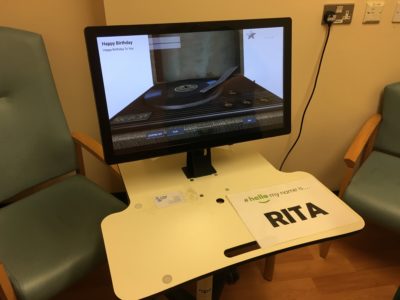RITA, which stands for Reminiscence Interactive Therapy Activities, is an innovative, evidence-based, state-of-the-art digital therapy system which allows patients to use apps, games and other leisure activities as part of their hospital recovery.
Used primarily for elderly patients with cognitive impairments, such as dementia, the user-friendly technology is proving extremely popular across United Lincolnshire Hospitals NHS Trust’s three main hospital sites (Lincoln, Boston and Grantham) and has shown to be effective in calming distressed or anxious patients.
The interactive touch screen system allows patients to enjoy relaxation music, watch archive BBC news footage, view old photographs and listen to famous speeches, to help spark memories and start conversations on the wards.
It can also be personalised with bespoke images and content in order to create a ‘life story’ collage, which is of particular help to patients with dementia.
Each unit costs £6,000 and consists of a 22 inch main display system along with a 10 inch mobile tablet – with the Trust investing in 11 units in total so far.
RITA has been most widely used across both wards on the 6th floor at Pilgrim (elderly care), thanks to a dedicated volunteer who has been trained specifically on the system, but she can also be found entertaining patients in A&E, rehabilitation and palliative, end of life care services.
In addition to the popular reminiscence apps, other well used activities on the system include karaoke, bingo, quizzes, jigsaws and even virtual pig racing.
Deputy chief nurse at ULHT Jennie Negus, who is based at Pilgrim hospital said: “Patients with acute confusion, delirium or dementia can often become agitated in unfamiliar hospital surroundings.
“Care needs can then become very complicated and challenging for both the patients and the healthcare staff involved.
“The easy-to-use software available through RITA enables our staff to personalise the care of their patients, which they can utilise themselves, along with nurses, therapists, carers or hospital volunteers.
“Some of the feedback we’ve had so far from patients has been really positive including an elderly lady who was undergoing rehabilitation and was regularly using the exercises on RITA to assist her recovery. The tablet version is also lovingly known as ‘Little RITA’ on one of our wards.”
 Sarah Haines, Clinical Nurse Speciality on Hatton ward (frailty) at Lincoln County Hospital said RITA has had a wonderful impact on her patients.
Sarah Haines, Clinical Nurse Speciality on Hatton ward (frailty) at Lincoln County Hospital said RITA has had a wonderful impact on her patients.
“It’s great for dementia patients but also for those with short-term memory issues who perhaps come into hospital slightly confused,” said Sarah.
“We’ve had whole bays of patients taking part in the exercise classes and using the interactive videos. The bingo and jigsaws are also really popular.”
The next steps for RITA involve utilising her Skype facility to enable patients to contact their carers and relatives while in hospital and also help with discharge planning and ongoing care discussions.
If you see RITA on one of the wards, be sure to stop say ‘hello’.
